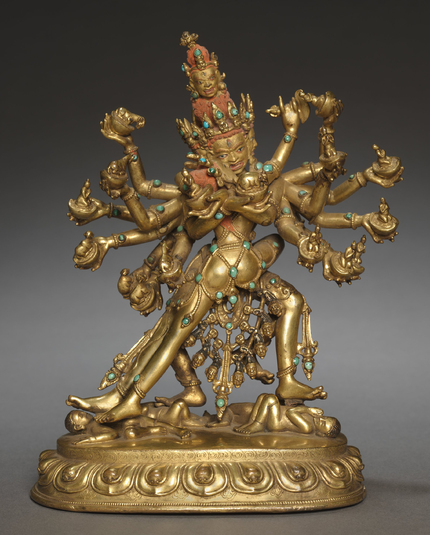
Item: Hevajra (Buddhist Deity) - (Hevajra Tantra)
| Origin Location | Tibet |
|---|---|
| Date Range | 1500 - 1599 |
| Lineages | Sakya, Ngor (Sakya) and Buddhist |
| Size | 18.40cm (7.24in) high |
| Material | Metal, Mercuric Gild, Painted Face/Hair, Precious Stone, Stone Inset: Turquoise |
| Collection | The Cleveland Museum of Art |
| Catalogue # | 1969.120 |
"...Shri Hevajra with a body blue in colour, eight faces, sixteen hands and four legs. The main face is blue, right white, left red, upper face smoky; the two remaining pairs of faces are black. Each face has three eyes and four bared fangs; yellow hair flowing upwards; the top of the head is marked with a vishvavajra. The sixteen hands hold sixteen skullcups. The first right holds a white elephant, the first left holds the yellow God of Earth; these two embrace the Mother. In the second right is a blue horse; third - ass with a white patch; fourth - yellow bull; fifth - ash-coloured camel; sixth - red man; seventh - blue sharabha; eighth - cat with a white patch. In the second left hand is the white God of Water; third - red God of Fire; fourth - green God of Air; fifth - white God of the Moon; sixth - red God of the Sun; seventh - blue Yama; eighth - yellow Holder of Wealth. Each head has a crown of five dry human skulls; and a necklace of fifty fresh heads; six bone ornaments; the two right legs are extended, on the thighs the toes of the two folded left legs are pressing in the half-[vajra] posture in a dancing manner; possessing the nine sentiments of dancing: grace, strength and ugliness; laughter, ferocity and frightful; compassion, fury and peace. In the lap is the mother Vajra Nairatmya, with a body blue in colour, one face, two hands, three eyes; yellow hair flowing upwards; right a curved knife, left holding a skullcup and embracing the father; five dry human skulls as a crown; a necklace of fifty dry [skulls]; five bone ornaments; left leg extended and the right drawn up embracing the father. Both are standing in the middle of a blazing fire of pristine awareness." (Ngagwang Legpa).
"...in the east black Gauri, right hand holding a curved knife, left a rohita fish; south red Chauri, right hand holding a damaru, left a pig; west yellow Vetali, right hand holding a tortoise, left a skullcup; north green Ghashmari, right hand holding a snake, left a skullcup; north-east blue Pukkashi, right hand holding a lion, left an axe; south-east white Shavari, right hand holding a monk, left a monk's staff; south-west purple Chandali, right hand holding a wheel, left a plough; north-west multi-coloured Dombini, right hand holding a vajra, left a wrathful gesture. Also, all have one face, two hands, three eyes and yellow hair flowing upward; naked, adorned with five ornaments of bone; a crown of five human skulls and a necklace of fifty skulls. With the left leg extended and the right in a half-lotus posture, in a dancing manner, they stand in the middle of a blazing fire of pristine awareness." (Konchog Lhundrub).
Jeff Watt [updated 6-2019]
Buddhist Deity: Hevajra Main Page
Artist: Sonam Gyaltsen & Atelier (Sculpture)
Collection of the Cleveland Museum of Art
Artist: Sonam Gyaltsen & Atelier (Ishtadevata)
Artist: Sonam Gyaltsen & Atelier (Hevajra)
Collection of the Cleveland Museum of Art (Sculpture Masterworks)
Buddhist Deity: Hevajra (Sculpture)
Buddhist Deity: Hevajra Sculpture (Masterworks)
Buddhist Deity: Hevajra (Tantra Iconographic Form)
Buddhist Deity: Hevajra (Best Examples, Sculpture)
